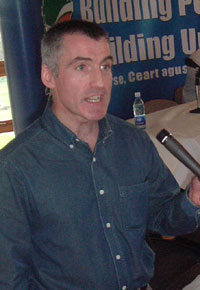18 January 2007 Edition
Cúige Uladh AGM: From South Africa's past to Ireland's future

Declan Kearney, chair of Cúige Uladh
Policing debate part of broader strategic plan
BY PEADAR Ó FAOLÁIN
The upbeat and relaxed mood of nearly 300 delegates to the Cúige Uladh AGM last Sunday, 14 January, belied the seriousness of the political juncture we are now at.
The Tí Chulainn Centre in Mullaghbawn, South Armagh, is the ideal setting for republicans to meet. The magical Slieve Gullion mountain, a symbol of Irish resistance to British rule, stands as a sentinel behind it while the rich South Armagh countryside embraces the Centre as it embraced our freedom fighters down through the years.
It was against this backdrop that Sinn Féin’s Cúige Uladh met. Delegates from across Ulster gathered to review the past year, plan for the year ahead and elect a new officer board.
As much as anything, though, they came to express their views on the political developments of the past few weeks and to hear Ronnie Kasrils of the African National Congress explain how the South Africans’ experience could be the yardstick by which Irish republicans measure progress in our own negotiations.
Kasrils was a senior military figure in Umkhonto we Sizwe’s war against the apartheid regime. He is now a minister in the South African Government.
Declan Kearney, chair of Cúige Uladh, opened the AGM. He cited 2006 as a “momentous year for Irish republicanism”, a year that saw thousands come to the streets to mark the 90th anniversary of the 1916 Rising and the 25th anniversary of the H-Block hunger strike.
The success of these events was down to the strength of a republicanism more popular now than ever before, said Kearney.
Year of opportunity
Kearney called on activists to see “2007 as a year of opportunity, to make strategic advances electorally, politically and organisationally.
“We should view the forthcoming electoral contests in the 6 and 26 Counties, and all our political work of the coming year, in terms of how we fearlessly go toe-to-toe with our opponents in the battle for hearts and minds throughout the island.
“We must bring the dynamic of political transition into every aspect of Irish society and it is with this revolutionary perspective that we should approach the debate on policing.”
Conor Murphy MP spoke next and warned against reducing the present debate to support for the PSNI. He stated that we need to see this issue in the context of a positive response from the DUP.
“We all know of the excesses of the RUC and their surrogates, but this current phase is about much more than policing.
“Significant advances have been made. The DUP, the party set up to oppose power sharing, has been brought to the point of power sharing.
“Can you or I imagine Ian Paisley, the ‘no’ man of Irish politics, sitting on the All- Ireland Ministerial Council with Sinn Féin?
“And if DUP members are to hold ministerial office, it will be within the power sharing and all-Ireland arrangements set out in the Good Friday Agreement.
“That is the context for the present debate on policing and the special Ard Fheis scheduled for the end of January,” concluded Murphy.
In the plenary session that followed, delegates expressed their worries about the PSNI’s ability to deliver proper civic policing, particularly in view of it remaining an armed force.
Others voiced reservations about the fact that RUC members who killed and abused nationalists were still serving in the PSNI with impunity.
Speaking to An Phoblacht Paul Henry from South Derry said that “the mood of the conference was positive and delegates had an air of determination about them. The thing is,” said Paul, “when republicans have a battle to fight, that is when they are at their best – and I think that the mood of the people in there today is about them spoiling for the fight.”
